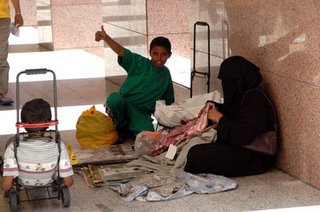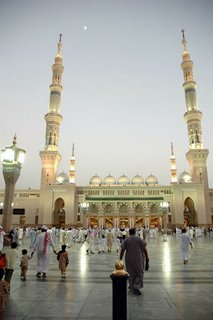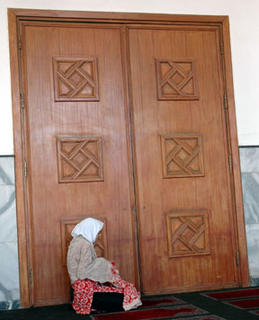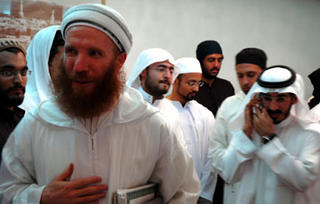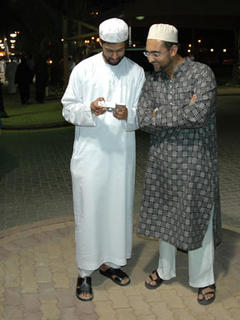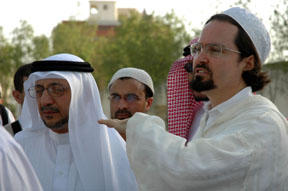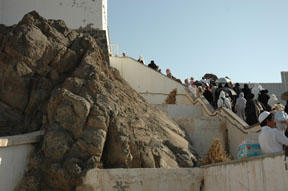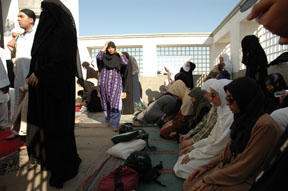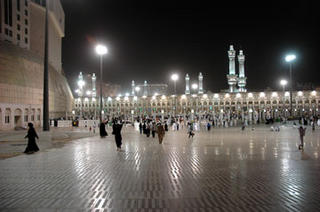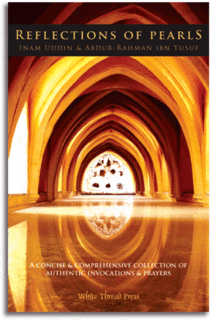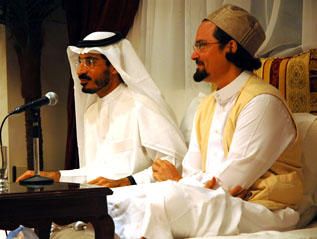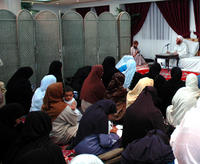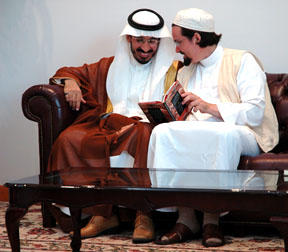 Photo: Shaykh Abdallah Al-Kadi and Shaykh Hamza Yusuf. © Fareena Alam. Please do not re-use without permission and proper credit.
Photo: Shaykh Abdallah Al-Kadi and Shaykh Hamza Yusuf. © Fareena Alam. Please do not re-use without permission and proper credit.
To be invited to Madina is indeed a great blessing, and, truth be told, it is sufficient as a blessing. But Allah is wonderfully Generous. Not only were we present in Madina, we were there with some of the most gifted Shuyukh of our time, luminaries on the path to God. Among them, a direct descendent of he who came to illuminate the hearts of men and to take humanity out of darkness into light like the dazzling full moon on a black night. It was a truly humbling experience to sit at the feet of Shaykh Muhammad al Yaqoubi, who taught us the
Shama’il of Imam Tirmidhi. Shaykh Muhammad is truly awe-inspiring, explained in part, by him being from the blessed progeny of the Beloved of God, peace be upon him.
A description of Shaykh Muhammad here is but laconic; there is little chance of doing justice to him in such few words. Just by looking at him, it instils in you a thirst for knowledge about our Nabi, peace be upon him.
He is in the room but I’m convinced he isn’t. As some brothers mentioned, it’s like he’s from a different era. Throughout his classes I was mesmerised by his deep insight and candour. His joy at discussing all the different aspects of Rasoolullah’s (صلي الله عليه و سلم) life is a joy to behold. It made me think at some points that he didn’t need any of us there. He would get the same joy at just teaching to an empty room – such is the love that he has for his grandfather, the Messenger of Allah, صلي الله عليه و سلم. How could I be grateful enough to the Prophet of Islam, صلي الله عليه و سلم, when I was still benefiting from that which he left behind?
The study of the Shama’il was nicely complimented by the class taught by Shaykh Abdullah al –Kadi, which was titled Buyut an-Nabi: ‘Houses of the Prophet’, صلي الله عليه و سلم. I had never met or even heard of the Shaykh prior to this trip, so it was a gift from the Rihla organisers to unite us here in Madina. It was Shaykh Abdullah who had facilitated for us most of our trips around the Holy cities, and he worked around the clock to ensure our stay was comfortable and enjoyable. Shaykh Abdullah warms the heart with his amazing personality. He narrated inspiring and moving stories about our Nabi’s (صلي الله عليه و سلم) relationship with his wives. His (صلي الله عليه و سلم) undying love for Khadija, may God be pleased with her, her sacrifices for him (صلي الله عليه و سلم), and the deen of Allah, her belief in him as a Messenger of God (صلي الله عليه و سلم); we were taught that their relationship is a time-honoured template for those looking for success. We covered all of the wives of the Prophet – raised by Allah with the title Umm al Mu’mineen: Mothers of the Believers. The class on his (صلي الله عليه و سلم) relationship with A’isha, may God be pleased with her, was particularly memorable as it highlighted the everyday matters of relationships and some of the hardships that he (صلي الله عليه و سلم) experienced. But it was constantly peppered with insights into the Prophets’ character and kindness. ‘I am no longer concerned about death because I know you will be my wife in Jannah’ he used to say to A’isha.
On another occasion we learnt of his (صلي الله عليه و سلم) tenderness with Saffiyya, may God be pleased with her. He (صلي الله عليه و سلم) wiped away her tears with his thobe because she had become upset at being called a Jew by the other wives. He (صلي الله عليه و سلم) told her ‘Say to them: My husband is a Prophet, my father is a Prophet [Aaron] and my uncle is a Prophet [Moses], whereas only your husband is a Prophet.’
Shaykh Abdullah – himself from the blessed family of the Prophet (صلي الله عليه و سلم) – advised us throughout to be gentle with our spouses, to resolve disputes in the best of ways and to have excellent character when dealing with one another. A beautiful class taught by a beautiful teacher.
In the blessed company of Shaykh Jamal Zahabi, a hanafi scholar, we covered the fiqh of Umrah. Shaykh Jamal would often mix with the brothers at meal times and his patience and good humour really left a mark on me. And who could forget his heart-stirring voice? His rendition of ‘Ya Imam al-Rusli’ brought tears to the eye, joy to the soul and cultivated the seeds of love for the Best of Creation, peace be upon him.
And, of course, inspiring us with his very presence was Shaykh Hamza Yusuf. The inimitable Shaykh Hamza, under whose guidance and leadership this sacred journey came to fruition. I’ve been deeply moved by Shaykh Hamza ever since I came across his lectures and writings and the Rihla proved I’m not alone. If I was to write about every person whose life he has touched I would need to write a few volumes and that would just be brushing the surface. During the three weeks, I saw glimpses of what makes him the man he is. Anyone who observes, with a clear mind, will see a man lost in the love of the Prophet, صلي الله عليه و سلم. Shaykh Hamza carries with him the spirit of Islam: deeply sincere, magnanimous in nature and a truly selfless soul. On one of the nights we went to visit the Rawdah, he made a plea to the brothers not to elongate their Nawafil prayers at the various places of worship and to give other brothers and sisters the chance to pray there. He said, ‘that is where the reward is, to think of your brother before you think of yourself.’
Shaykh Hamza taught from the
Reflections of Pearls dua’a book and although we never managed to complete it, what we did cover was sufficient. Mainly, that if we take up the sunnahs of the Messenger, صلي الله عليه و سلم, we will find
barakah in our lives and the road to paradise becomes smooth, God Willing. Commentating on the dua’a for the market place, Shaykh Hamza reminded us, ‘God purchased your soul for your life and against it is paradise. That is the souk of the Akhira.’
Along the way we celebrated the life of the Prophet, صلي الله عليه و سلم, by visiting the many places he visited, masajid he prayed at, wells he drank from, streets he walked by, battlefields he negotiated, and the sites of historic speeches he gave, صلي الله عليه و سلم. It was surreal. This is where it all began. One man (صلي الله عليه و سلم) with a small band of followers. They gave their lives so we could live to say ‘La ilaha ilallah.’ What a legacy they left behind. At masjid-e Aqabah, where the first Muslims from Madina came to pledge their allegiance to the Prophet (صلي الله عليه و سلم), I felt as though we had been moved back to that very time; such was the spirit of chivalry, brotherhood and sacrifice that still emanates from within those four walls.
The moments spent in the Rawda of the Prophet (صلي الله عليه و سلم), were moments from another world. Spending time in his company (صلي الله عليه و سلم). Tears flowed naturally here, hard hearts melted; arrogance wilted. Minutes seemed like days. Everyone longs for their beloved. I was at home here. Shaykh Muhammad reminded us: ‘We go to him, peace be upon him, with no knowledge and no claims – except with the claim that we love him, peace be upon him.’ My feelings are conveyed far more eloquently than I ever could in the poem of the great scholar Shaykh Ibn Hajar Al-‘Asqalani:
By the gate of your generosity stands a sinner, who is mad with love,O best of mankind in radiance of face and countenance!Through you he seeks a means [tawassala], hoping for Allah’s forgiveness of slips;from fear of Him, his eyelid is wet with pouring tears.Although his genealogy attributes him to a stone [hajar],how often tears have flowed, sweet, pure and fresh!Praise of you does not do you justice, but perhaps,In eternity, its verses will be transformed into mansions.My praise of you shall continue for as long as I live,For I see nothing that could ever deflect me from your praise.
- G. H.
